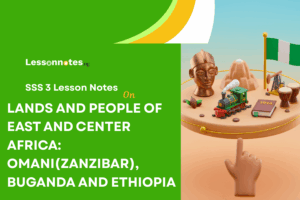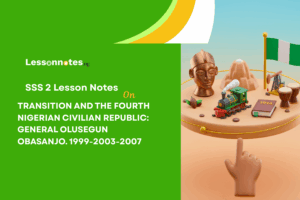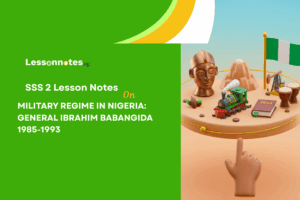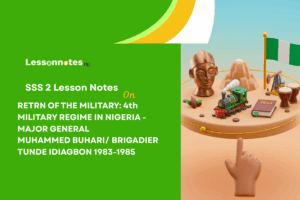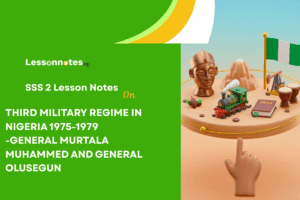THE JUKUN KINGDOM SS1 Nigerian History Lesson Note
Download Lesson NoteTopic: THE JUKUN KINGDOM
The Jukun Kingdom, also known as Kwararafa, was a powerful state that existed in what is now central Nigeria. The Jukun people created a strong kingdom along the Benue River that at its height controlled a large area and influenced many neighboring states. This kingdom was known for its strong military, unique religious practices, and well-organized government. This lesson explores the origins of the Jukun people, how their kingdom was organized, reasons for their rise to power, and the factors that eventually led to their decline.
Names and Identity
The People and Their State
Understanding who the Jukun were:
- The people are called the Jukun or Kwararafawa
- Their state is known as the Jukun Kingdom or Kwararafa
- Based near Ibi on the Benue River in modern-day Taraba State, Nigeria
- Spoke the Jukun language, part of the Niger-Congo language family
- Had a distinct culture and identity
- Known for their powerful military
- Feared and respected by neighboring states
- Controlled important trade routes
- Had a complex religious system
- Created one of the most powerful pre-colonial states in central Nigeria
Historical Significance
Why the Jukun are important in history:
- Dominated central Nigerian politics for centuries
- Influenced the development of many other states
- Controlled vast territories at their peak
- Challenged and sometimes defeated the Hausa states
- Even threatened the powerful Bornu Empire
- Maintained independence against outside forces for centuries
- Developed sophisticated political systems
- Created long-lasting cultural traditions
- Left a legacy that continues among modern Jukun people
- Their history shows how African states rose and fell before European colonization
Early History and Origins
Migration Traditions
Stories about where the Jukun came from:
- Several different traditions explain their origins
- One says their ancestor Agadu came from Kordofan (in modern Sudan)
- Another claims they came from Yemen through Wadai to Ngazaragamu
- This tradition says they migrated with the Kanuri people
- Then moved southward to the Benue River area
- Some link them to the Hausa as one of the “bastard states”
- These were states influenced by but not directly descended from Hausa
- Archaeological evidence shows settlement in the area for many centuries
- Likely combined local peoples with migrants from elsewhere
- These origin stories show connections to distant places
Early Settlements
How the Jukun established themselves:
- First settled along the Benue River around Ibi
- Built their main capital at Wukari
- Established other important centers at Puje and Kona
- Created a network of settlements for defense
- Chose locations with good farmland
- Selected sites along trade routes
- Built settlements near river crossings
- Cleared forest areas for farming
- Constructed defensive walls around towns
- Gradually expanded their territory through conquest
Foundation of the Kingdom
How the Jukun state developed:
- Likely formed as a unified kingdom by the 1500s
- Created by bringing together smaller communities
- United under the leadership of the Aku (king)
- Early rulers established the basic political structure
- Set up religious institutions that supported state power
- Expanded through conquest of neighboring peoples
- Incorporated conquered peoples into their system
- Developed a distinct cultural identity
- Created symbols of kingship and authority
- Established traditions that would last for centuries
Socio-Political Organization
The Aku (King)
At the top of Jukun society was the sacred king:
- Called the “Aku” in the Jukun language
- Considered semi-divine, not a normal human
- Surrounded by many taboos and restrictions
- Could not eat in public
- Not allowed to touch the ground with bare feet
- Expected to control the weather and ensure fertility
- Lived in an elaborate palace at Wukari
- Wore special regalia showing his status
- Had many wives who played official roles
- If he became ill or old, might be ritually killed
The Council of Chiefs
The Aku was advised by important officials:
- Led by an official called the Abo
- The Abo was second in power to the Aku
- Council included both political and religious leaders
- Advised the Aku on important matters
- Could check the Aku’s power in some ways
- Helped implement royal decisions
- Represented different interests in the kingdom
- Some positions were hereditary (passed down in families)
- Others were appointed based on ability
- This council helped govern the large kingdom
Provincial Administration
The kingdom was divided for better management:
- Various provinces made up the kingdom
- Each province had its own chief
- These chiefs reported to the central government
- Provincial chiefs collected taxes and tributes
- They settled local disputes
- Maintained order in their areas
- Provided soldiers when needed
- Each province also had religious officials
- Local cults operated at the provincial level
- This system balanced central and local power
Military Organization
The Jukun had a strong army:
- Known for their military prowess
- Organized into specialized units
- Used iron weapons like spears and swords
- Some mounted soldiers on horseback
- Infantry (foot soldiers) formed the bulk of forces
- Archers used powerful bows and arrows
- Military leaders held important positions
- Soldiers were recruited from throughout the kingdom
- Successful warriors received honors and rewards
- Military success brought slaves and tribute
Religious System
Religion was central to Jukun governance:
- Religion and politics were closely connected
- Priests held great power and influence
- Cult rituals were essential to Jukun life
- The Aku served as both political and religious leader
- Religious ceremonies marked important events
- Priests performed sacrifices for community welfare
- Each province had its own religious cults
- Sacred objects held special powers
- Religious festivals unified the people
- Spiritual beliefs supported political authority
The Rise of the Jukun Kingdom
Military Strength
The Jukun built their power through warfare:
- Developed a reputation as fierce warriors
- Expanded territory through military conquest
- Launched raids against neighboring states
- Created effective battle tactics
- Used the element of surprise in attacks
- Had good knowledge of the terrain
- Exploited divisions among enemies
- Trained soldiers regularly
- Built defensive fortifications
- Military success brought wealth and captives
Economic Foundations
A strong economy supported Jukun power:
- Agriculture provided the economic base
- Grew crops like sorghum, millet, and yams
- Kept livestock for meat and milk
- Fishing in the Benue River added to food supply
- Hunting supplemented diet and provided skins
- Craft production created valuable goods
- Blacksmiths made tools and weapons
- Pottery, basketry, and weaving were well-developed
- Surplus production supported specialized workers
- Economic strength allowed military campaigns
Trade Networks
Commerce enhanced Jukun wealth:
- Controlled important trade routes along the Benue River
- Connected northern and southern trading networks
- Traded agricultural products with neighbors
- Salt was an important trade item
- Iron and copper goods were exchanged
- Participated in the trans-Saharan trade
- Exported ivory, skins, and agricultural products
- Imported luxury goods and horses
- Collected tolls from traders passing through territory
- Trade brought wealth and outside influences
Slave Trade
Human captives became an important resource:
- Captured people in warfare
- Sold some captives as slaves
- Used others as workers in the kingdom
- The slave trade increased Jukun wealth
- Connected them to long-distance trading networks
- Provided labor for farms and households
- Enhanced the status of elite Jukun
- Created dependent populations
- Helped support the military system
- This practice had serious human costs
Vassal States
The Jukun created a network of tributary states:
- Conquered territories became vassals
- These states had to pay regular tribute
- Required to provide soldiers when needed
- Had to acknowledge Jukun authority
- Some were allowed to keep their own rulers
- Others received Jukun-appointed officials
- Jukun influence spread far beyond direct rule
- Vassals included states like Idoma and Igbira
- Even powerful Hausa states like Kano and Zaria paid tribute (1582-1618)
- Some traditions claim they received tribute from as far as Calabar
The Height of Jukun Power
Period of Greatest Influence
The Jukun reached their peak of power:
- Greatest strength during 16th and 17th centuries
- Controlled large territories in central Nigeria
- Threatened even the powerful Hausa states
- Conducted successful military campaigns
- Built impressive capital at Wukari
- Developed sophisticated political institutions
- Established tributary relationships with many states
- Created a sphere of fear and respect
- Influenced cultural practices beyond their borders
- Maintained independence against external threats
Relations with Hausa States
The Jukun challenged the Hausa kingdoms:
- Raided Hausa cities periodically
- Extracted tribute from some Hausa states
- Defeated Kano and Katsina in some battles
- According to traditions, Zaria paid tribute to Jukun
- Competed with Hausa states for control of trade routes
- Cultural exchange occurred despite conflicts
- Some Hausa influence entered Jukun society
- The Jukun represented a southern check on Hausa power
- These relationships fluctuated between peace and warfare
- Created a balance of power in the region
Relationship with Bornu
The Jukun interacted with the powerful Bornu Empire:
- Sometimes allies, sometimes enemies
- Competed for influence over the same regions
- Shared some cultural and commercial connections
- Bornu’s military power limited Jukun expansion eastward
- Diplomatic exchanges occurred between the states
- Participated in overlapping trade networks
- Both states influenced the peoples between them
- This relationship was often tense and competitive
- Bornu’s superior cavalry gave it military advantages
- Each recognized the other as a significant power
The Decline and Fall of the Jukun Kingdom
Military Defeats
External forces weakened Jukun power:
- Bornu’s military became too strong to resist
- Superior tactics and weapons gave Bornu advantages
- The Jukun suffered significant defeats
- Lost control of some tributary states
- Their reputation for invincibility was damaged
- Attacks from Chamba people pressured from another direction
- Could no longer maintain their extensive territory
- Military setbacks led to loss of tribute income
- Had to focus more on defense than expansion
- Gradually retreated to core territories
The Fulani Jihad
Islamic holy war impacted the Jukun:
- The Fulani Jihad began in Hausaland in 1804
- Led by Usman dan Fodio
- Jihad forces eventually attacked Jukun territories
- Jukun resistance was strong but ultimately insufficient
- Lost some territories to the Sokoto Caliphate
- The Jihad brought ideological challenges
- Traditional religious practices were threatened
- Some Jukun converted to Islam
- Created internal divisions within Jukun society
- Weakened the traditional authority of the Aku
Economic Changes
Changes in trade patterns hurt the Jukun:
- Abolition of the slave trade reduced profits
- New trade routes bypassed Jukun territories
- Lost control of key trade routes
- European goods changed traditional trade patterns
- Neighboring states developed independent trade connections
- Economic power declined with military power
- Could no longer finance large military campaigns
- Traditional craft production faced outside competition
- Resource base shrank with territorial losses
- Economic decline accelerated political weakness
Internal Problems
The kingdom faced challenges from within:
- Dynastic struggles among Jukun princes
- Fights over succession to the throne
- Weakened central authority
- Provincial areas became more independent
- Traditional religious system lost some influence
- Population may have declined due to warfare
- Could not maintain previous administrative systems
- Elite groups competed for diminishing resources
- Unity of purpose was lost
- These internal divisions prevented effective response to external threats
Legacy of the Jukun Kingdom
Cultural Survival
Despite political decline, Jukun culture continued:
- The Jukun people maintained their identity
- Traditional practices survived in modified forms
- The Aku continued as a ceremonial figure
- Religious beliefs adapted to new conditions
- The Jukun language persisted
- Artistic traditions continued
- Social structures remained recognizable
- Historical memory preserved through oral traditions
- Today’s Jukun people maintain connections to their history
- Cultural resilience despite political changes
Historical Significance
The importance of the Jukun in Nigerian history:
- Demonstrated how African states rose and fell before colonization
- Showed the importance of trade in state development
- Illustrated how religion and politics could be integrated
- Represents an important chapter in the history of central Nigeria
- Their interactions with Hausa and Bornu show complex regional politics
- Influenced the development of many neighboring peoples
- Created traditions of statecraft that influenced later governments
- Left archaeological remains that help understand pre-colonial Nigeria
- Their story challenges simplistic views of African history
- Provides important context for understanding modern ethnic relations
Modern Jukun
The Jukun people today:
- Still live in parts of Taraba, Benue, and Nasarawa States, Nigeria
- Maintain aspects of traditional culture
- The position of Aku still exists as a traditional ruler
- Engage in farming, fishing, and trade
- Face challenges of modernization and development
- Work to preserve their language and customs
- Interact with neighboring ethnic groups
- Navigate the complexities of modern Nigerian politics
- Remember their history as a once-powerful kingdom
- Contribute to Nigeria’s cultural diversity.





